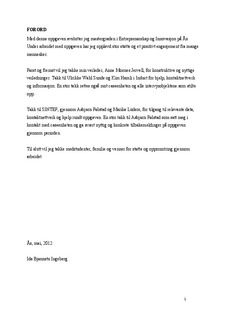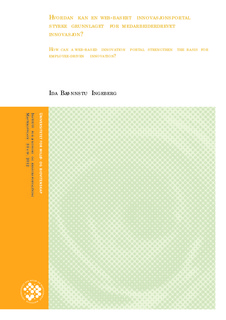| dc.description.abstract | Temaet for denne masteroppgaven var medarbeiderdrevet innovasjon (MDI). Bakgrunnen for oppgaven var en interesse rundt forskeres fremhevelse av et uutnyttede potensial for innovasjon hos vanlige medarbeidere som ikke arbeider i spesialiserte stillinger innen utvikling og innovasjon.
Studien bygget på en problemstilling som ønsket å belyse ”hvordan en web-basert innovasjonsportal kan styrke grunnlaget for medarbeiderdrevet innovasjon” og var avgrenset ved å undersøke den første fasen av innovasjonsprosessen. Problemstillingen ble besvart av tre forskningsspørsmål som tok utgangspunkt i relevant litteratur og teori. Disse undersøkte hvem som engasjerte seg i en portal og hvorfor, hvordan en portal understøttet potensialet i medarbeideres kompetanse og ideer så det kan utnyttes i innovasjonssammenheng, og hvilken betydning lederes støtte hadde i forhold til dette.
Studien benyttet seg av et eksplorativt undersøkelsesdesign og innhentet kvalitative og kvantitative data fra en caseenhet. Seks dybdeintervjuer, en innholdsanalyse av caseenhetens portal, og sekundærdata hentet fra SINTEF, var grunnlag for resultater og analyse. Et hovedfunn fremhevet at medarbeidere involverte seg i første fasen av innovasjons- prosessen gjennom portalen. Et annet hovedfunn omhandlet mulige begrensninger for idedeling, og innebar at portalen muligens ikke understøttet et bredt omfang av ideer, og at høy synlighet og lav tiltro til egen ide kunne begrense hvilke ideer som ble delt. Studiens konklusjon viste hvordan en web-basert innovasjonsportal kunne styrke grunnlaget for MDI gjennom direkte og indirekte mekanismer. De direkte mekanismene innebar synliggjøring, oppfanging og formidling av ideer og kompetanse til beslutningspersoner. Medarbeidere som er sentrale innen MDI involverte i innovasjonsarbeid ved å dele ideer og bruke deres kompetanse for å belyse andres ideer. Involveringen økte mulighetene for at en virksomhet systematisk kunne anvende dette i innovasjonsprosessen. Indirekte mekanismer innebar økt stimulering av engasjement gjennom lederes støtte og større åpenhet i innovasjonsarbeid. Konklusjonen tydeliggjorde verdien av web-baserte innovasjonsportaler i forhold til MDI. Researchers have previously explored the untapped potential for innovation among ordinary employees who are not working in specialized positions, regarding development and innovation. This area interested me, leading me to choose employee-driven innovation (MDI) as the topic for my master thesis. The study was designed to shed light on "how a web-based innovation portal can strengthen the basis for employee-driven innovation". The first phase of the innovation process was the focus for the study. Three research questions were raised, which were based on relevant literature and theory. The questions explored who was engaged in a portal and why, how a portal supported the potential of employees' skills and ideas so that they can be utilized in the innovation context, and the importance of managerial support in relation to this. The study made use of an exploratory study design and obtained qualitative and quantitative data from a case unit. Six in-depth interviews, a content analysis of the case unit's portal, and secondary data obtained from SINTEF, created the basis for results and analysis. A key finding highlighted that staff were involved the first phase of the innovation process through the portal. Another key finding referred to the possible limitations to sharing ideas through a portal, for example that the portal may not have supported a wide range of ideas, and that high visibility and low confidence in their own ideas would limit the ideas that were shared. The conclusion of the study shows how web-based portal innovation can strengthen the basis of EDI through direct and indirect mechanisms. The direct mechanism involved visualization, and both capture and disseminate ideas and expertise to policy people. Employees who play a key role in EDI were involved in innovation by sharing ideas and using their expertise to illuminate the ideas of others. Involvement increased the chances that a business could systematically apply this in the innovation process. Indirect mechanisms involved increased stimulation of the leaders' commitment through support and greater openness in innovation activities. The conclusions highlighted the value of a web-based portal in innovation in terms of EDI. | no_NO |

